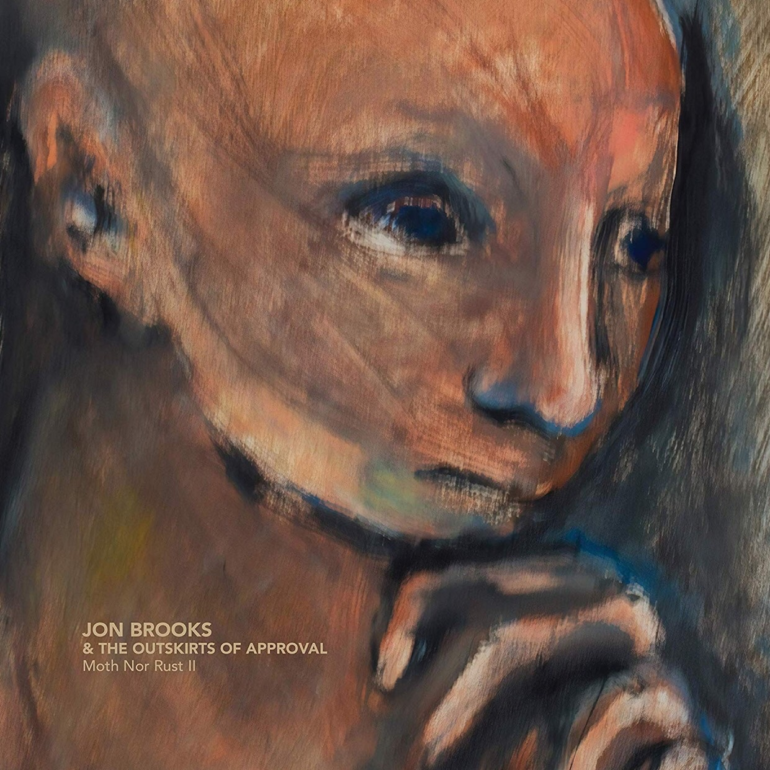“19. Lay not up for yourselves treasures upon earth, where moth and rust doth corrupt, and where thieves break through and steal: 20.But lay up for yourselves treasures in heaven, where neither moth nor rust doth corrupt, and where thieves do not break through nor steal: 21 For where your treasure is, there will your heart be also.”
(Matthew 6:19-21)
Fans of Jon Brooks will immediately recognize that the songs on Moth Nor Rust II, come from the much loved, 2009 release Moth Nor Rust. Having performed these songs throughout many years in live shows, Brooks felt that he owed the songs, and his fans, a more realized production in keeping with their revered emotional complexity and insight. With courageous, carefully designed artistry, Moth Nor Rust II presents an updated musical interpretation of songs that explore the nature of our shared planetary existence.
Joining Jon, with exquisite musical accompaniment, is a group of players known as the Outskirts of Approval, comprised of Neil Cruickshank, Christina Hutt, Jason LaPrade, Rosemary Phelan, John Showman, Ed Hanley and Vivienne Wilder. Many of these musicians joined Brooks in 2018, for the masterful “No One Travels Alone”, which featured songs built on a “corona” cycle, wherein the first line of the next song is the last line of the previous, forming a series of songs that finally end where they began.
It is not surprising that Brooks would choose to reinvigorate and reimagine the powerful songs from Moth Nor Rust. They specifically reflect and investigate the turbulent times we are living through – bombarded by misshaped information and outpaced by a technological revolution that often leaves us bewildered and alone.
How then to find hope, purpose and destiny, is a theme worthy of an artist of Brooks’ brilliance.
Fallen Tree Records, his new album distributor, explains: “Brooks sees a world distracted by its unknowable future: environmental collapse, humanity’s forced retirement by AI and potentially the fall of democracy. His earlier question, “What makes us human?” is ever more compelling.”
The songs weave together into an emerging image of a collective social order that has somehow failed to recognize or grasp, the source and substantive gift of human possibilities. Within the mystery of these songs, are some notable creative choices. With the exception of only one song, all of the songs are written from the perspective of “we” and “he/she,” which removes, on some level the subjective, and creates a kind of empathic compassion. The songs prompt us, in our listening, to see our common connectivity and move us, perhaps, to become what we are truly meant to be.
Introduced by Jon’s alluring finger styled guitar playing, the opening song, “When We Go,” sets the pace and mood of what follows. In a clear unambiguous statement, we are counseled that only “love” will survive our dissolution into that “Some Great Other,” “to that place where moth nor rust, cannot touch us past this dust- if it’s not love, we can’t take it, when we go”. Brooks is not just proposing that our pursuit of accumulation (things, ideas, opinions) cannot survive our death but cannot even inform our living. For without love, wherever we go, we are ensnared by that which is other than our true path. In this song alone, we are summoned to let go, before we go, if we dare journey forward and see into our situation. The songs that follow will provide the framework for such “seeing.”
“What’s Within Us” elaborates the condition that we all find ourselves in. This vast roaming seven-minute opus presents an elaborate cast of characters caught working, living, breathing, interacting, merely as shadows of their possessed, unrealized possibilities. They live compromised and in contradiction to their real nature. We are the artists, and the peacemakers, the meek and mourning, the reviled and the persecuted but we are not “doing” what we are intended to do! How has this become possible? How has this become our reality? Jon Brooks provides a clue to his inspired commentary, by quoting from the Gospel of Thomas 70 – “ If you bring forth what is within you, what you bring forth will save you, what you do not bring forth will destroy you.” Is this a warning or signpost? Of the ten songs on Moth Nor Rust II, this song is of the utmost philosophical importance, for it indicates a precious truth. “If it’s not love”, as Brooks has earlier sung, that resides within us, then our work, our worry, our frantic gathering, will lead to nothing. As Brooks writes, “if we keep what’s within us, what’s within us will kill us, but if we give what’s within us, what’s within us, will save us”.
The Gospel of Thomas, discovered in 1945 along with other writings in Egypt, is a work of profound inspiration, for it imparts a great truth – that to know one’s self, truly, is the goal and aspiration of human life. In knowing ourselves, we cannot help but know love and compassion, for all. Of course, in these cynical times, such a message would clearly be heard with derision. The third song on Moth Nor Rust II, The Crying of the Times #3, speaks to and articulates that deafness. A song filled with such sadness and question, this song completes an opening trilogy that establishes the premise upon which this album is based – where we lay our treasure, then that is where our destiny resides.
At this point in the album, the songs become personal stories. “In the Alleys,” an unnamed waitress meets a fate that only imagination might detail -“where the secret and the sacred still collide.” In “Small”, a character named Jamie, longs for purpose and understanding, as his life corrodes from unfulfilled dreams. This song is achingly poignant and heartfelt. Sketching the landscape of Jamie’s world, as he falls under it’s weight, in despair, longing to be something larger, more defined but realizing only how small, we really are. “O, and if I was an astronaut- me and the problems that I got – I could see how small we really are.” Listening, the heart cannot help but be filled with empathy for this man’s dilemma, for who among us, has not felt so disorientated, so hopeless, so powerless. Yet even in such despair, wisdom may be found.
“War Resister” is the third of these personal stories with a tale of man whose conscience is opened to the reality of war and its cost, “what’s freedom, if it’s bought with gun?”
In between these stories, Jon Brooks writes and sings, one his most enduring songs – a favourite and beloved at most of his concerts. “There Is Only Love” defines the dimension of the human gift and the essence of what is within us that must be given, for us to be saved. “We are the air that sings through the trees. We are each other and we are on our knees. We are the mystery and the wind in all beauty and suffering – that is to say, there is only love.” Coming after Small, this song has a deep forceful impact because we realize intuitively that this is a truth that somehow gets overlooked and yet it is the grail cup that holds the portent to all possible salvation.
“Safer Days”, another character based song, suggests the disappearance of it’s narrator but who still hopes that we will meet again in better days. There is menace implied in this song that harkens back to Brooks’ work, “The Smiling And Beautiful Countryside,” 2014 – a collection of haunting and disturbing murder ballads which contrasts, yet magnifies, the brave hope of “Moth Nor Rust.”
“High Five” is the last song sung on the album and is the only song in the first person from the perspective of the singer himself. Although, like the other character songs, it may in fact be another third person story. This song is new, in that it has not appeared on record. Also, it is quite different than the other songs on the album and might indicate the future direction both musically and thematically that Jon Brooks intends to pursue. (Rumour has it that during these sessions, many other songs were recorded but no released date has been proposed.) “High Five” is uplifting and mysterious, for is conveys or suggests that the journey through to “seeing” leaves a subtle change in the interrelations between ordinary folk. As if one, who has seen into themselves, is perhaps free to interact in silent yet acknowledged communication. “I’ve not yet heard the tone of his voice or the accent of his speech, nor have I ever come up with a better justification of God.” Beautiful played and produced, the song is an intoxicating addition to the songs of Moth Nor Rust.
The final song is an instrumental of “When We Go”, bringing us around again to the beginning and perhaps we shall know it for the first time. It may even indicate a departure – a salutation – a resolution. Moth Nor Rust II is an eloquent, superbly performed and realized recording, which celebrates Jon Brooks’ extraordinary talent as a writer and visionary. Brooks writes songs that tease the intellect and open the heart but above all, encourage continued search for and interest in developing a meaningful life, lived and shared with each other.
Douglas McLean fell in love with music at a very early age and has worked as a musician and songwriter since his early teens. He has a deep love for the written word and has spent his life in pursuit of language as a means to convey what Van Morrison once called “the inarticulate speech of the heart”. He lives deep in the Almaguin Highlands with his wife and their dog. Douglas is active in local radio, recording, producing and writing, in and around Huntsville, Ontario.
His website is:
http://www.douglasmcleanmusic.com



